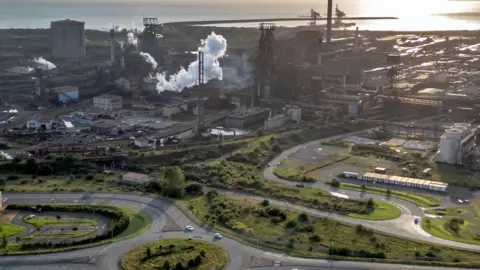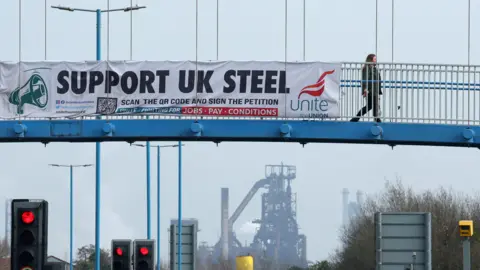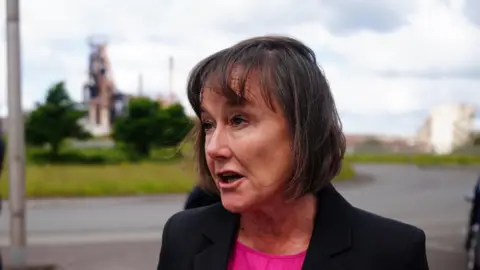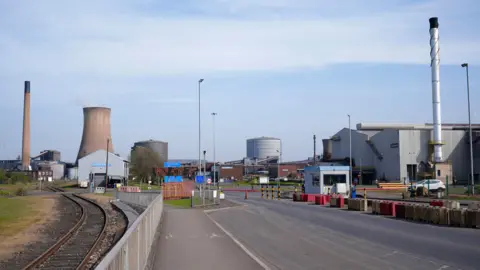'Double standards' to protect steel - politicians
 Reuters
ReutersWelsh politicians have accused the UK government of double standards over an emergency bill to protect steel in England.
In a debate discussing a proposed British Steel law to save a Scunthorpe plant, Plaid Cymru and Liberal Democrat MPs criticised the government's plans, saying it had failed to do the same for Port Talbot.
Liz Saville-Roberts, Plaid's Westminster leader, said: "Scunthorpe gets security, Port Talbot gets a pittance."
The bill has since been approved by Parliament and UK ministers say the two steel works are in different situations, and Port Talbot is in a better position because of the Labour government.
Traditional steel production in Wales came to an end in September, with the loss of some 2,800 jobs at Tata Steel's Port Talbot plant.
The site is now transitioning to greener steel production with a new electric arc furnace, which requires fewer workers to run, expected to be in place from 2027.
The closure of the blast furnaces was controversial in Wales, with Plaid politicians calling for nationalisation of the steel works.
In a post to X, Darren Millar MS, Leader of the Welsh Conservatives, shared a letter requesting the Senedd be recalled from Easter recess as a result of the UK government's decision.
"There will be implications for the Welsh Steel industry as a result of the UK Parliament session tomorrow," said Miller.
"These must be urgently considered by the Welsh Parliament."
Speaking during the debate, Saville-Roberts said Wales' first minister Eluned Morgan had dismissed her party's calls for nationalisation of Welsh steel as "pipe dreams".
"This government did not intervene in Wales," she said.
 Reuters
Reuters"Plaid Cymru believes Port Talbot could and should have received equal treatment alongside Scunthorpe.
"The measures we are debating today would have been able to be used to save the blast furnaces at Tata Steel in Wales.
"People in Wales will not forget today, today is a day of bitter, bitter disappointment for Port Talbot."
Speaking to BBC Wales, Secretary of State for Wales Jo Stevens described the situation at the plant in Scunthorpe as being "very different" to that in Port Talbot.
"It's the only site in the UK where virgin steel is made, and that's why it's a matter of national importance, strategic importance," said Stevens.
 PA Media
PA MediaDavid Chadwick, spokesperson for the Welsh Liberal Democrats, said the closure of the blast furnaces had started a decline in economic activity south Wales that affected his constituency.
He said: "It's rubbing salt in the wounds for the people of Port Talbot to now hear the government acknowledge the importance of primary steel production as a strategic national asset
"Where was this urgency when Welsh steel communities were crying out for support, when Tata Steel announced over 2,800 job losses in Port Talbot last year, the largest steel works in the country, a key strategic asset, the manufacturing heart of south Wales."
Chadwick, MP for Brecon, Radnor and Cwm Tawe, whose grandfather worked in the blast furnaces, added: "The simple fact is this, the government did not recall parliament for Port Talbot. It did not recall parliament for Wales.
"When crisis hits in Wales, it's tolerated.
"When it hits elsewhere, it becomes a national emergency."
 PA Media
PA MediaBusiness Secretary Jonathan Reynolds told the Commons the Port Talbot deal was negotiated by the previous Conservative government.
"We were not able to reopen the deal, but we did negotiate a better deal," he said.
Speaking on BBC Breakfast ahead of the debate, the industry minister, Sarah Jones, said: "When we came into government, there was a deal on the table with Tata Steel in Port Talbot.
"We negotiated in 10 weeks a much better deal, but there was a private company willing to invest, who are now investing.
"We have maintained 5,000 jobs on the site and there will be a future for that site with an electric arc furnace.
"There is no such deal on the table at the moment [for Scunthorpe], that's what is different.
"The other difference is that these are the last blast furnaces making primary steel that we have in this country, and also what is different of course is that the world is changing.
"As we have seen with the Prime Minister's support for our defence industry in recent times, we need to ensure as a country we have sovereign capability to make steel, and that is what we are securing today."
